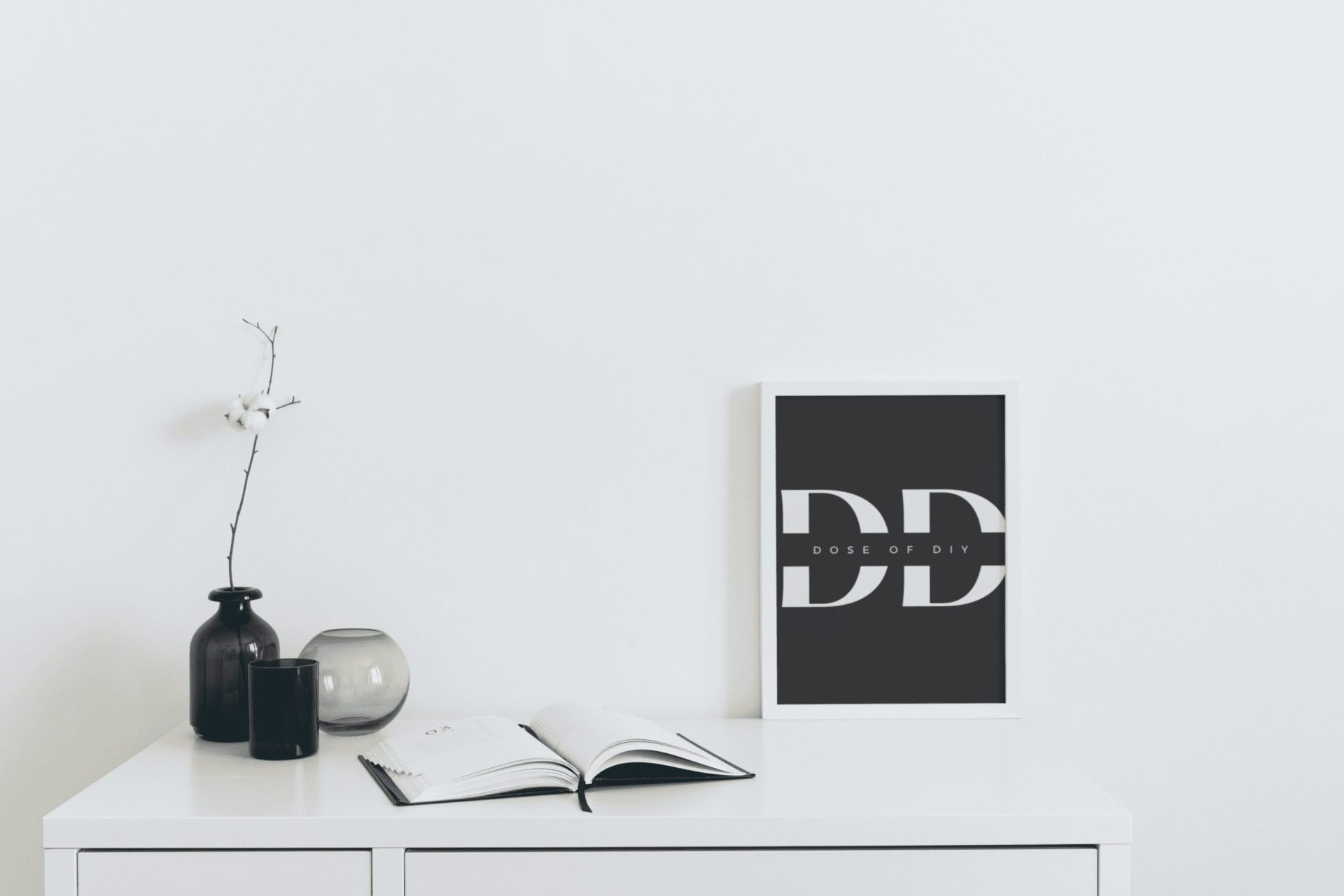Are you tired of the outdated, boring look of your bathroom floor tile? Take matters into your own hands with a simple DIY project to give your tiled floor a fresh, modern makeover.
Your floor plays a pretty crucial role in the overall look and feel of your bathroom. Unfortunately, ripping up the tile and replacing it and dealing with grout can be a pain! Luckily, painting is a surprisingly easy and affordable way to update your bathroom floor, and with the right materials and techniques you can give your tiles a vibrant, customized look without breaking the bank.

As an Amazon Associate I may earn from qualifying purchases at no additional cost to you!
Required Materials
- Primer
- White Paint
- Gray paint
- Wood filler
- Stencils
- Wood graining tool
- Assorted paint brushes
- Clear coat
Optional Materials
Before I painted the floor, I had just added a frame to my bathroom mirror, applied a marble epoxy kit to my vanity counter, added a fluted design to my vanity cabinets, and added a tub skirt. Don’t forget to check out those blog posts / YouTube videos!
Anyways, you can see what I was starting with in the photo below. It was a very dark gray tile that I was bored of.

Clean Your Floor Tile
First, make sure to clean your floor tile. This is important to help your paint stick to the floor tile and prevent it from looking unprofessional. You can vacuum to pick up and dust and dirt, then wipe it down. You can use a Swiffer Wet Jet or get on your hands and knees. There isn’t anything specific you have to use for this step. You can even use Lysol wipes if you want! Then, I used tack cloths to help pick up anything that is sticking. This will help prevent the paint from looking bumpy.
Play Around a Bit
Second, I put frog tape around the edges. If you haven’t heard of frog tape, it’s a stronger version of painters tape that is less likely to give you those messy paint lines.
Then, I was playing around and seeing what would stick. So, I watered down some white paint in a paint tray and was just seeing how it looked.

After a little, I started playing around with trying to see if it would be able to get a “wood” look. I used a wood graining tool to get those wood patterns. Unfortunately, I did this project before I created my YouTube channel, so I didn’t record it, but I do have a video of me showing how to do this wood technique! Alternatively, you can check out this post about how I updated my pantry door where I used the same technique!

Fill Gaps Between Floor Tiles
However, I realized I needed to fill in the gaps between the tiles if I wanted it to look realistic. So I used wood filler to fill in the dips between the tiles and sanded that down with my orbital sander. Then, I vacuumed up all the dust and used tack cloths to try to make sure there was nothing on the floor before I put the primer on over it. Otherwise, the paint may look bumpy if there are any dust particles or anything where you are painting.
Paint Wood Planks Over Floor Tile
Afterwards, I used the gray paint to outline where my “wood planks” would be. Then, I mixed some of the white paint and the gray paint in a paint tray to get a lighter gray. With this lighter color, I took those cheap brushes and I tried to paint that gray in random places on the “wood planks” to mimic the different shades throughout wood. As weird as it sounds, the cheap brushes are crucial because it looks more streaky, which makes it look more like wood.

After that, I mixed the gray and white paint again to come up with a slightly darker gray than before. This is what I used for the “grain” of the wood (see image below).

Then, I decided I wanted to make it more subtle. So, I mixed the paint paint with water to get a more transparent white color, that I painted over it all until it looked more like it was actually a gray-stained wood (see image below).

Use Stencil To Apply Design to Floor Tile
After that, I decided I wanted to try this herringbone stencil to get a white herringbone wood design.

I used this stencil adhesive spray to help keep the stencil against the floor. It helps prevent the paint from spilling under. Try not to use too much paint for this part, otherwise it makes it easier for it to look messy!

Top Off Your New Floor with a Top Coat
Once I finally got a design I liked, I covered it with 2 coats of this clear coat meant for floors!
And that’s all there is to it! I did this over a year ago and it looks exactly the same! It has not chipped anywhere!
If you want to paint your floor with something else, check out how I painted my entryway tiles or how I applied a darker stain to the wood floors in my bedroom. Otherwise, you can check out my Painting the Floor Pinterest Board.



Leave a Reply